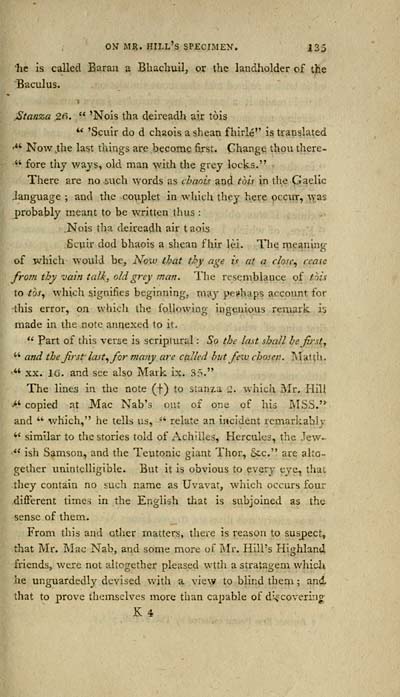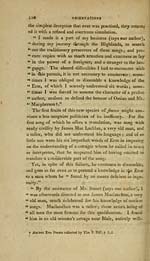J. F. Campbell Collection > Report of the Committee of the Highland Society of Scotland, appointed to inquire into the nature and authenticity of the poems of Ossian
(317)
Download files
Complete book:
Individual page:
Thumbnail gallery: Grid view | List view

ON MR. hill's SPECLMEN. 135
"he is called Baran a Bhachuil, or the landholder of the
Baculus.
;Stanza 2fi. " 'Nois tha deireadh air tòis
** 'Scuir do d chaois a shean f hirle" is translated
•*' Now the last things are become first. Change thou there-
" fore thy ways, old man with the grey locks."
There are no such words as chnois and this in the Gaelic
.language ; and the couplet in wliich they here occur, "vyas
probably meant to be written thus :
Nois tha deireadh air taois
Scyir dod bhaois a shean f hir lei. 'llie rrieaning
of which would be, Now that thy age ù at a c/ose, cease
from thy vain talk, old grey man. The resemblance of this
to tòs^ which signifies beginning, rna}' perhaps account for
this error, on which the following ingtjuious remarli is
made in the note annexed to it.
" Part of this verse is scriptural : So the last shall he first,
" and the first last ^formany are called hut few chose?? . Tvlattli.
•" XX. le. and see also Mark ix. 35."
The line^ in the note (f) to stanz-a '2. which Mr. Hill
>' copied at Mac Nab's out of one of his MSS."
and "• which," he tells us, ** relate an incident remarkably
*' similar to the stories told of Achilles, Hercules, the Jew-
** ish Samson, and the Teutonic giant Thor, &c." are alto-
gether unintelligible. But it is obvious to every eye, that
they contain no such name as Uvavat, which occurs four
different times in the English that is subjoined as the
sense of them.
From this and other matters, there is reason to susj)ect,
that Mr. Mac Nab, and some more of Mr. Hill's Highland
friends, were not altogether pleased wtth a stratagem whiclt
he unguardedly devised with a vievy to blind them ; and
that to prove themselves more than capable of d'".^ covering-
K4
"he is called Baran a Bhachuil, or the landholder of the
Baculus.
;Stanza 2fi. " 'Nois tha deireadh air tòis
** 'Scuir do d chaois a shean f hirle" is translated
•*' Now the last things are become first. Change thou there-
" fore thy ways, old man with the grey locks."
There are no such words as chnois and this in the Gaelic
.language ; and the couplet in wliich they here occur, "vyas
probably meant to be written thus :
Nois tha deireadh air taois
Scyir dod bhaois a shean f hir lei. 'llie rrieaning
of which would be, Now that thy age ù at a c/ose, cease
from thy vain talk, old grey man. The resemblance of this
to tòs^ which signifies beginning, rna}' perhaps account for
this error, on which the following ingtjuious remarli is
made in the note annexed to it.
" Part of this verse is scriptural : So the last shall he first,
" and the first last ^formany are called hut few chose?? . Tvlattli.
•" XX. le. and see also Mark ix. 35."
The line^ in the note (f) to stanz-a '2. which Mr. Hill
>' copied at Mac Nab's out of one of his MSS."
and "• which," he tells us, ** relate an incident remarkably
*' similar to the stories told of Achilles, Hercules, the Jew-
** ish Samson, and the Teutonic giant Thor, &c." are alto-
gether unintelligible. But it is obvious to every eye, that
they contain no such name as Uvavat, which occurs four
different times in the English that is subjoined as the
sense of them.
From this and other matters, there is reason to susj)ect,
that Mr. Mac Nab, and some more of Mr. Hill's Highland
friends, were not altogether pleased wtth a stratagem whiclt
he unguardedly devised with a vievy to blind them ; and
that to prove themselves more than capable of d'".^ covering-
K4
Set display mode to: Large image | Transcription
Images and transcriptions on this page, including medium image downloads, may be used under the Creative Commons Attribution 4.0 International Licence unless otherwise stated. ![]()
| Permanent URL | https://digital.nls.uk/81746057 |
|---|
| Description | Volumes from a collection of 610 books rich in Highland folklore, Ossianic literature and other Celtic subjects. Many of the books annotated by John Francis Campbell of Islay, who assembled the collection. |
|---|
| Description | Selected items from five 'Special and Named Printed Collections'. Includes books in Gaelic and other Celtic languages, works about the Gaels, their languages, literature, culture and history. |
|---|

